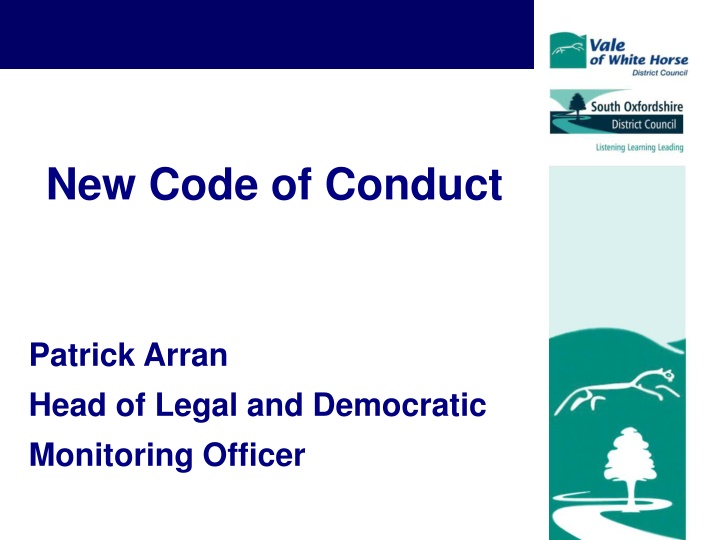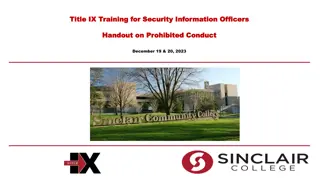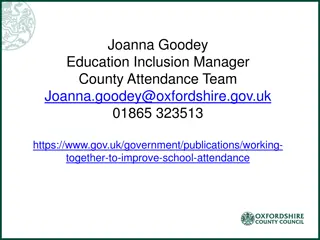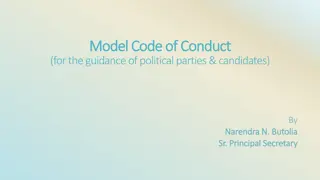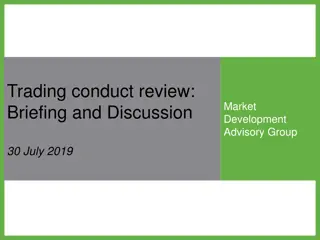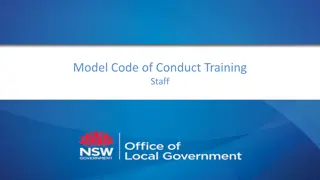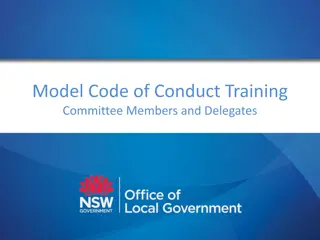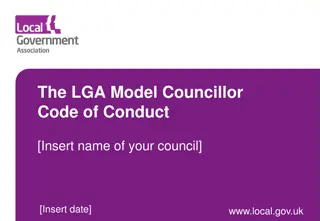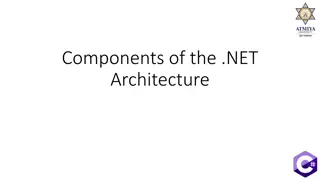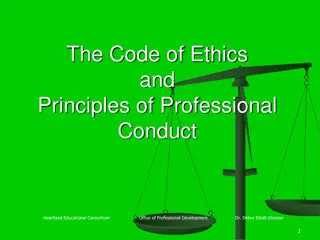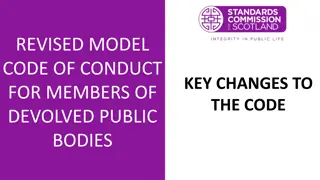The New Code of Conduct for Councillors in Oxfordshire
Providing an update on the new model Code of Conduct for Oxfordshire, this session explains the differences, provides examples of specific requirements, and focuses on the new approach to interests. It also includes a reminder about the Nolan Principles, the purpose of Codes of Conduct, and when the Code applies to councillors.
Download Presentation

Please find below an Image/Link to download the presentation.
The content on the website is provided AS IS for your information and personal use only. It may not be sold, licensed, or shared on other websites without obtaining consent from the author.If you encounter any issues during the download, it is possible that the publisher has removed the file from their server.
You are allowed to download the files provided on this website for personal or commercial use, subject to the condition that they are used lawfully. All files are the property of their respective owners.
The content on the website is provided AS IS for your information and personal use only. It may not be sold, licensed, or shared on other websites without obtaining consent from the author.
E N D
Presentation Transcript
New Code of Conduct Patrick Arran Head of Legal and Democratic Monitoring Officer
Session Aims To provide an update to members following adoption of a new model Code of Conduct for Oxfordshire: Explain the differences introduced by new Code Provide examples to members regarding specific requirements of the Code Focus on new approach to Interests 2
Reminder about Nolan Principles Selflessness acting solely in the public interest Integrity Not putting yourself in a position where you might be obligated or influenced inappropriately Objectivity taking decisions impartially and on merit Accountability to the public and open to scrutiny Openness take decisions in an open and transparent matter Honesty should be truthful and not behave in a way that allows honesty to be questioned Leadership always acting in a way that preserves public confidence 3
Purpose of Codes of Conduct Protect and assist you to model behaviour and provide a personal check and balance Set out the type of conduct that could lead to action Fundamental aim is to create and maintain public confidence in the role of councillor Background to the Oxfordshire Model Code LGA Guidance is very useful 4
When does the Code apply? Applies to you when you are acting in your capacity as a councillor which may include when: you misuse your position as a councillor Your actions would give the impression to a reasonable member of the public with knowledge of all the facts that you are acting as a councillor 5
When does the Code apply You should behave according to the highest standards of personal conduct in everything you do as a councillor The Code only applies when you are acting in your capacity as a councillor you are not on duty 24/7/365 If you give the impression that you are acting in your capacity as a councillor social media is a particular issue here Don t you know who I am? 6
What types of activity are covered? All forms of communication and interaction Face to face meetings Online or telephone meetings Whilst the Code only applies when you act in an official capacity, be aware of private conduct which might cause embarrassment for the Council. 7
Principles and Obligations Start of the Code = general principles but important! Obligations are those elements which may form the basis of a complaint and start at Paragraph 6.0 8
Respect Para 6.0 A Councillor: 6.1.1 Shall treat everyone, including other councillors and members of the public with respect. 6.1.2 Shall treat local authority employees, employees and representatives of partner organisations and those volunteering for the local authority with respect and respect the role they play. 9
Respect Linked to disrepute where is the line drawn? Doesn t prevent robust political rough and tumble Be aware that the line between genuine debate / political discourse and personal offence is the benchmark Works both ways, you are entitled to be treated with respect by the public 10
Bullying Harassment and Discrimination A Councillor: 6.2.1 Shall not bully any person. 6.2.2 Shall not harass any person. 6.2.3 Shall promote equalities and not discriminate against any person. 11
Impartiality of Officers A Councillor: 6.3.1 Shall not compromise, or attempt to compromise, the impartiality of anyone who works for, or on behalf of, the local authority. 12
Impartiality of officers Protocol for Member Officer Relations sets out how members and officers should interact Should not criticise officers in public forum as they are not able to speak up for themselves can also be bullying and / or harassment Any issues should be taken offline and picked up with the line manager or Head of Paid Service Officers work for the local authority as a whole and must be politically neutral (unless they are political assistants). They should not be coerced or persuaded to act in a way that would undermine their neutrality. 13
Confidentiality and Access to Information (Busy Slide Alert) A Councillor: 6.4.1 Shall not disclose information either given to them in confidence by anyone or acquired by them which they believe, or ought reasonably to be aware, is of a confidential nature, unless i. They have received the consent of a person authorised to give it; or ii. They are required by law to do so; or iii. the disclosure is made to a third party for the purpose of obtaining professional legal advice provided that the third party agrees not to disclose the information to any other person; or iv. the disclosure is reasonable and in the public interest; and also made in good faith and in compliance with the reasonable requirements of the local authority and consultation with the Monitoring Officer has taken place prior to its release. 14
Confidentiality and Access to Information 6.4.2 Shall not improperly use knowledge gained solely as a result of their roleas a Councillor for the advancement of themselves, their friends, family members, employer or business interests. 6.4.3 Shall not prevent anyone from getting information that they are entitled to by law. 6.4.4 When making decisions on behalf of, or as part of, the Council shall have due regard to any professional advice provided by the Council s Officers. 15
Disrepute A Councillor: 6.5.1 Shall not bring their role or local authority into disrepute. Capable of very wide application most cases have this as an aspect. Note can be the office and / or the authority Decision making process is pertinent here public perceptions about integrity of the process is key As a Councillor, you are trusted to make decisions on behalf of your community and subject to greater scrutiny than members of the public. 16
Use of Position A Councillor: 6.6.1 Shall not use, or attempt to use, their position improperly to the advantage or disadvantage of anyone 17
Use of position You must not use, or attempt to use, your position improperly to the advantage or disadvantage of you or anyone else NIMBYISM Kevin O Neill Your position as a member of the local authority provides you with certain opportunities, responsibilities, and privileges, and you make choices all the time that will impact others. However, you should not take advantage of these opportunities to further your own or others private interests or to disadvantage anyone unfairly 18
Use of resources and facilities A Councillor: 6.7.1 Shall not misuse council resources. 6.7.2 Shall, when using the resources of the local authority or authorising their use by others, act in accordance with the local authority's requirements; and ensure that such resources are not used for political purposes unless that use could reasonably be regarded as likely to facilitate, or be conducive to, the discharge of the functions of the local authority or of the office to which they have been elected or appointed. 19
Compliance with the Code of Conduct A Councillor: 6.8.1 Shall undertake Code of Conduct training as required by the local authority. 6.8.2 Shall cooperate with any Code of Conduct assessment, investigation, hearing and/or determination. 6.8.3 Shall not intimidate or attempt to intimidate any person who is likely to be involved with the administration of any investigation or proceedings. 6.8.4 Shall comply with any sanction imposed on them following a finding that they have breached the Code of Conduct. 20
Interests Problem area in public life has always been interests and the potential conflict between private interest and public duty Sometimes a source of confusion - biggest uncertainty is interests that are not financial Danger of removing from a debate those who know most about the matter and have a valuable contribution if in doubt, get out . (Ware v Neath Port Talbot Borough Council) Openness and transparency on personal interests a guide (included in the pack) easy to read ready reckoner 21
Interests Generally There are now three categories - confusing to say the least - broken down as follows: Disclosable Pecuniary Interests Other Registrable Interests Non-Registrable Interests 22
Disclosable pecuniary interests Set out in - The Relevant Authorities (Disclosable Pecuniary Interests) Regulations 2012 Disclosable Pecuniary Interest means an interest of yourself, or of your partner if you are aware of your partner's interest, within the descriptions set out below. "Partner" means a spouse or civil partner, or a person with whom you are living as husband or wife, or a person with whom you are living as if you are civil partners. You must ensure that your register of interests is kept up-to- date and within 28 days of becoming aware of any new interest, or of any change to a registered interest, notify the Monitoring Officer. 23
DPI Employment Employment, office, trade, profession or vocation means that you must disclose: Any employment, office, trade, profession or vocation carried on for profit or gain. (i.e. not just in the district) 24
DPI Sponsorship Sponsorship covers: Any payment or provision of any other financial benefit (other than from the relevant authority) made or provided within the relevant period in respect of any expenses incurred by M in carrying out duties as a member, or towards the election expenses of M. This includes any payment or financial benefit from a trade union within the meaning of the Trade Union and Labour Relations (Consolidation) Act 1992. 25
DPI Contracts This covers: Any contract which is made between the relevant person (or a body in which the relevant person has a beneficial interest) and the relevant authority (a) under which goods or services are to be provided or works are to be executed; and (b) which has not been fully discharged. 26
DPI Land This element covers: Any beneficial interest in land which is within the area of the relevant authority. It includes any land ownership no matter how small or if in joint ownership, your home and any investment properties 27
DPI Licences This includes: Any licence (alone or jointly with others) to occupy land in the area of the relevant authority for a month or longer. Includes allotments 28
DPI Corporate Tenancies This might include shops / commercial units for example and includes: Any tenancy where - to M s knowledge (a) the landlord is the relevant authority; and (b) the tenant is a body in which the relevant person has a beneficial interest. Would not cover your place of work unless you have an interest in the business 29
DPI Securities Any beneficial interest in securities (shares) of a body where (a) that body (to M s knowledge) has a place of business or land in the area of the relevant authority; and (b) either (i) the total nominal value of the securities exceeds 25,000 or one hundredth of the total issued share capital of that body; or (ii) if the share capital of that body is of more than one class, the total nominal value of the shares of any one class in which the relevant person has a beneficial interest exceeds one hundredth of the total issued share capital of that class. 30
Sensitive interests A sensitiveinterest is as an interest which, if disclosed, could lead to the councillor, or a person connected with the councillor, being subject to violence or intimidation. Where you have a sensitiveinterest you must notify the Monitoring Officer with the reasons why you believe it is a sensitive interest. If the Monitoring Officer agrees they will withhold the interest from the public register The recommendation from the Committee for Standards in Public Life is that candidates standing for, or accepting, public offices are not required publicly to disclose their home address. Sympathetic approach to home addresses 31
Participation with a DPI Unless dispensation has been granted, you may not participate in any discussion of, vote on, or discharge any function related to any matter in which you have a DPI You must withdraw from the room or chamber when the meeting discusses and votes on the matter. 32
Other Registrable Interests Now included in the South and Vale Code: You have a personal interest in any business of your authority where it relates to or is likely to affect: - any body of which you are in general control or management and to which you are nominated or appointed by your authority - any body (i) exercising functions of a public nature (ii) any body directed to charitable purposes or (iii) one of whose principal purposes includes the influence of public opinion or policy (including any political party or trade union) 33
Participation with an other interest Different to DPI in that it is not just financial and personal to you! Issue must be directly linked to the interests of one of your registrable interests and be related to its Financial Interest or Wellbeing For that organisation / entity You must declare at the meeting either at the declarations stage or if it occurs to you later You may speak only if members of the public are also allowed to speak but otherwise must not take any part in any discussion or vote on the matter You must not remain in the room unless you have been granted dispensation You do not have to declare the nature of a sensitive interest 34
What does wellbeing cover? Wellbeing can be described as a condition of contentedness, healthiness, and happiness. Anything that could be said to affect a person s quality of life, either positively or negatively, is likely to affect their wellbeing. It is not restricted to matters affecting a person s financial position . (Former) Standards Board 35
Non Registrable Interests A Non-Registrable Interest is something which: Directly affects your financial interest or well- being which is not a DPI or Other Registrable Interest or The financial interest or wellbeing of a relative or close associate 36
Declaration of non-registrable indirect interests Where a matter arises at a meeting which affects a. your own financial interest or well-being; b. a financial interest or well-being of a relative, close associate; or c. a body included in those you need to disclose under Other Registrable Interests as set out in Table 2 You must disclose the interest at the start of the meeting or at any time you realise you have an interest. 37
Participation where a non- registrable interest arises In order to determine whether you can remain in the meeting after disclosing your interest the following test should be applied Where a matter affects your financial interest or well-being: a. To a greater extent than it affects the financial interests of the majority of inhabitants of the ward affected by the decision and; A reasonable member of the public knowing all the facts would believe that it would affect your view of the wider public interest b. You may speak on the matter only if members of the public are also allowed to speak at the meeting. Otherwise, you must not take part in any discussion or vote on the matter and must not remain in the room unless you have been granted a dispensation 38
New Register of Interests Form You need to complete the new ROI form to comply with the new code 39
Dispensations You can apply to the Monitoring Officer for a dispensation Without the dispensation so great a proportion of the meeting would be prohibited from taking part Without the dispensation, the representation of different political groups dealing with that business would be so upset as to alter the likely outcome of any vote the granting of the dispensation is in the interests of the people living in the District 40
Dispensations If you have an interest, you can apply to the Monitoring Officer for a dispensation to: Participate in discussion of a matter or Participate in a vote Where Without the dispensation so great a proportion of the meeting would be prohibited from taking part Without the dispensation, the representation of different political groups dealing with that business would be so upset as to alter the likely outcome of any vote the granting of the dispensation is in the interests of the people living in the District 41
Questions to ask yourself Have I got an interest or stake of any kind in the outcome of a matter under discussion? If I find I have an interest or conflict what should I do? Would an objective third party knowing all the facts think the interest so significant that it would affect my judgement of the public interest? If they would think it might affect my judgement, what do I do? 42
Questions to ask yourself Only you can declare and it is your decision Take advice before the meeting. It allows you to discuss in private and to reach an informed decision. It is the reputation of the council as a whole that is affected by your decision Failure to declare can damage public trust Time and resource consumed dealing with complaints or challenges 43
Gifts and Hospitality A Councillor: 8.1 Shall not accept gifts or hospitality, irrespective of estimated value, which could give rise to real or substantive personal gain or a reasonable suspicion of influence to show favour from persons seeking to acquire, develop or do business with the local authority or from persons who may apply to the local authority for any permission, licence or other significant advantage. 8.2 Shall register with the Monitoring Officer any gift or hospitality with an estimated value of at least 50 within 28 days of its receipt. 8.3 Shall register with the Monitoring Officer any significant gift or hospitality that they have been offered but have refused to accept. 44
Gifts and hospitality There may be times when such a refusal may be difficult if it is seen as rudeness in which case you could accept it but must ensure it is publicly registered. You do not need to register gifts and hospitality which are to the Council Neither do you need to disclose gifts not related to your role as a councillor, such as Christmas gifts from your friends and family. It is appropriate to accept normal expenses and hospitality associated with your duties as a councillor. If you are unsure contact the Monitoring Officer for guidance. 45
Top Tips Consider your interests now and always update them as things change Read your papers carefully and try to anticipate any decisions / matters which could involve an interest Seek advice as soon as possible if you are not sure Only you can know whether you have an interest Err on the side of caution without being over cautious 46
Thank you Any Questions? 47
